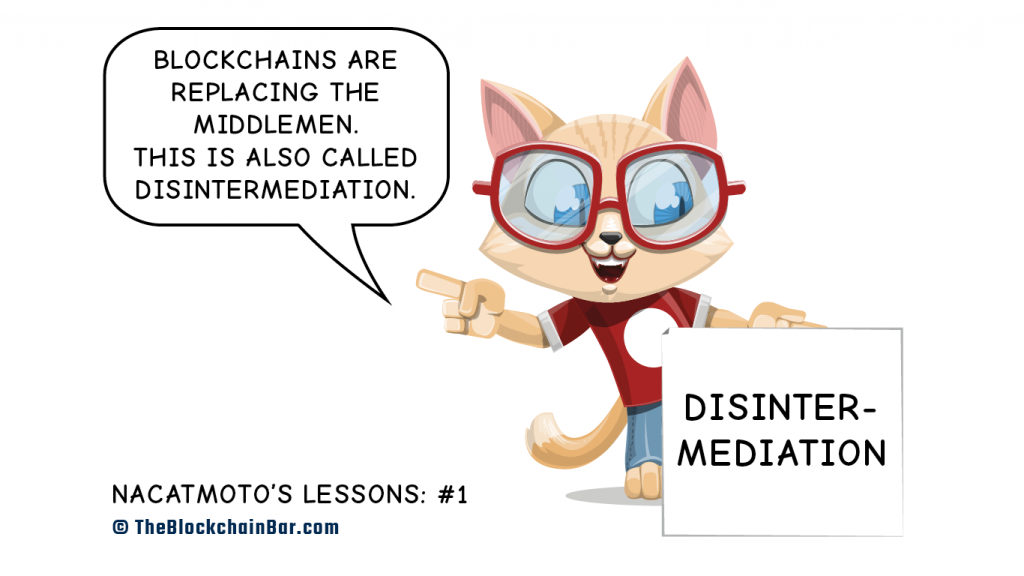Imagine your favourite bar: Great atmosphere, interesting people, cold drinks. Now, imagine the bar owner is a fraud. Everybody hates him. But it is the only bar around.
This is the situation our friends at The Blockchain Bar are facing. For years they have tolerated Marvin (the bar owner), even though he always tries to rip off his guests. He tries to cash in on being the only bar in town and raises the beer prices to unbearable levels.
Alice and Bob finally decide to do something. Together with the other guests they chase Marvin away. For good! Now, our friends have the bar all to themselves and live happily ever after. – Hm, not so fast: First they need to think about how to run the bar.
Blockchain is based on the same simple idea: Replacing the middleman with peer-to-peer interactions. This also means: Businesses that mainly act as a middleman in the exchange of goods and services are vulnerable to being replaced by the blockchain.
So they’ve chased the bar owner – the middleman – away. But who’s gonna run things now? Is the bar doomed? Find out in the next episode…
But maybe you first want to read more about disintermediation below.
Understanding Blockchain
Blockchains disintermediate industries
Satoshi Nakamoto invented Bitcoin because he wanted to get rid of the banks in the global financial system. (https://bitcoin.org/bitcoin.pdf)
Banks use their intermediary position to make huge profits without actually adding much value to anything. They are just sending money electronically around the globe.
We only need banks because we don’t trust each other. If Alice transfers 10 euros to Bob, how can he be sure that a) she originally had those 10 euros and that b) she has not already sent them to someone else? This is the reason why Alice and Bob use a bank to handle the transaction. The bank provides ‘trust’ to the deal.
But why are banks so expensive? And why do bank transfers usually take one or more days? Bits and bytes travel at the speed of light! What do they do with our money in the meantime?
Who would use banks if there was a faster and cheaper alternative? There is an alternative: It is called Bitcoin.
Bitcoin allows to transfer digital money globally and directly from sender to receiver without any banks as middlemen. And it’s safe. The transaction fees are low and the coins arrive within minutes. It only takes 20-30 minutes to be sure that the money has safely arrived.
So just like the bar guests in Blockruption’s Blockchain Bar chased their fraudulent bar owner away, bitcoiners chased the banks away. We don’t need banks anymore.
The technology that allows Bitcoin to transfer money safely without banks as middlemen is called a ‘blockchain’.
With blockchains, we can do much more than just money transfers. Blockchain technology is about to improve almost all parts of our society in the near future – from banking, insurance, logistics, energy, healthcare, to politics and government. In all these areas we still rely on middlemen to organise things and add ‘trust’ to transactions.
For example, an insurance is basically an agreement between many people to support the ones in need. Catastrophic events can’t be handled by one or a small number of affected parties. But they can be handled by many if they work together.
Not many houses burn down. But if one does, this is a very bad event for the owner. So many house owners get together and all pay for the reconstruction of the burned house.
The problem is that we don’t trust each other to fulfill the agreed duties in the case of damage. That’s why we ask an insurance company to provide trust to the system. Everyone pays a premium to the insurance company and they will settle the claims.
But with the insurance company as a middleman, new problems arise: insurance companies are slow. And they are not really independent because they want to earn money. Hence, they try to avoid settling claims at all cost. But, remember, dealing with damage was the reason we invented insurance companies in the first place.
What if we could have an insurance system that doesn’t need insurance companies anymore? With blockchain technology, we can invent such a system that works without intermediaries.
So in our Blockchain Bar the guests have chased the fraudulent bar owner away. Who should operate the bar now? How can this work without a central authority? Let’s find out.
In the following episodes, we will explain the basic concepts of this revolutionary technology with lots of stories from Blockruption’s Blockchain Bar.



